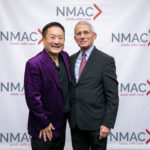 Can we end an epidemic in the middle of a pandemic? These are scary and confusing times. It is understandable to hit the “pause’ button.
Can we end an epidemic in the middle of a pandemic? These are scary and confusing times. It is understandable to hit the “pause’ button.
As we have seen, leadership plays a critical role in fighting any epidemic. Dr. Fauci at the many press conferences validates the importance of having a “trusted” voice. Hearing Ambassador Birx talk about long term survivors  shows that lessons learned fighting HIV help to inform the response to COVID-19.
shows that lessons learned fighting HIV help to inform the response to COVID-19.
NMAC wants to thank and support all of our HIV colleagues who are being deployed to fight COVID-19. From healthcare providers to epidemiologist, there are many in our movement who are being reassigned and we thank them for their service.
How does our movement provide HIV services in the middle of the COVID-19 pandemic? What happens when COVID-19 infects a person living with HIV? Is there a special protocol for managing someone who has both viruses?


 Since many people will now be working from home, it is also important to learn from Long Term Survivors about the reality that isolation caused by the virus (either one) can lead to depression. As we think about how to work from home, please do not forget the behavioral health challenges. We are asking everyone to isolate themselves for an undetermined amount of time. This presents a multitude of issues. If interacting with people was the best solution to ending the social isolation,how do you do that in the age of COVID-19? There are real mental health issues that must be managed when putting people in isolation for extended periods of time.
Since many people will now be working from home, it is also important to learn from Long Term Survivors about the reality that isolation caused by the virus (either one) can lead to depression. As we think about how to work from home, please do not forget the behavioral health challenges. We are asking everyone to isolate themselves for an undetermined amount of time. This presents a multitude of issues. If interacting with people was the best solution to ending the social isolation,how do you do that in the age of COVID-19? There are real mental health issues that must be managed when putting people in isolation for extended periods of time.
There are lots of questions, but not a lot of answers. In the middle of these challenges, we are asking everyone to be leaders. To steady our movement, tell the truth, and provide hope. Please take care, I am very worried. When Dr. Fauci says it’s going to get worse before it gets better, I believe him. Hopefully this will be over soon. Unfortunately, it feels like it’s going to be longer than we first thought.
Yours in the struggle,
Paul Kawata
